East African Economic Area

Sudan, Tanzania, Uganda, Malawi, Kenya (East African Economic Area)
- Introduction to the East African Economic Area of the African Civilization
- Christianity and Islam in the East African Economic Area
- Economic Profile of the East African Countries
- Businesspeople of the East African Economic Area
- Interactions of the East African Economic Area with the other African Economic Areas (West Africa, Central Africa, Southern Africa, Maghrebian)
- Interactions of the East African Economic Area with the other economic areas
- Logistics in East Africa
- Economic Organizations related to the East African Economic Area
The objectives of the subject “East African Economic Area” are the following:
- To define the economic characteristics of the East African Economic Area
- To know the economic profile of the East African Countries
- To understand the influence of the African Traditional Religions, Islam and Christianity on the East African Economic Area
- To understand the economic integration process in the East African Economic Area
- To analyze the main East African businesspeople
- To explore the economic relationships with the others economic areas of different civilizations
- To analyze the main Economic Organizations related to the East African Economic Area

The Subject “East African Economic Area” belongs to the following Online Programs taught by EENI Global Business School:
Course: Business in East Africa, Christianity & Business, Islam & Business.
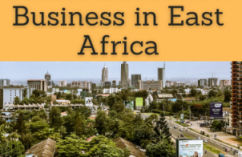
Doctorate: Ethics, Religions & Business, African Business, Islamic Countries, World Trade.
Master in Business in Africa , International Business.

EENI Partnerships with Educational Institutions
Languages:  or
or  Africa Oriental
Africa Oriental  Afrique Orientale
Afrique Orientale  África Oriental.
África Oriental.
Download the syllabus “East African Economic Area” (PDF).
- Credits of the Subject “East African Economic Area”: 2

- Duration: two weeks
Masters adapted to the Eastern African Students:  Eritrea,
Eritrea,
 Ethiopia,
Ethiopia,
 Kenya,
Kenya,
 Mauritius,
Mauritius,
 Malawi,
Malawi,
 Seychelles,
Seychelles,
 Somalia,
Somalia,
 Sudan,
Sudan,
 Tanzania, and
Tanzania, and  Uganda.
Uganda.
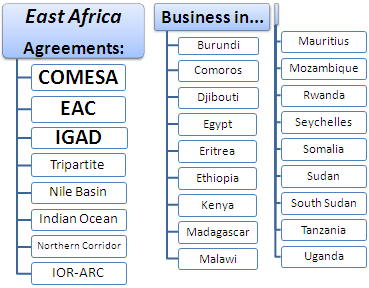

East African Economic Area.
The East African Economic Area consists of:
- Fourteen continentals countries: Burundi, Egypt, Eritrea, Ethiopia, Kenya, Malawi, Mozambique, Rwanda, Somalia, Sudan, South Sudan, Tanzania, Uganda, and Djibouti
- Four insular countries: The Comoros, Madagascar, Mauritius, the Seychelles
Sample: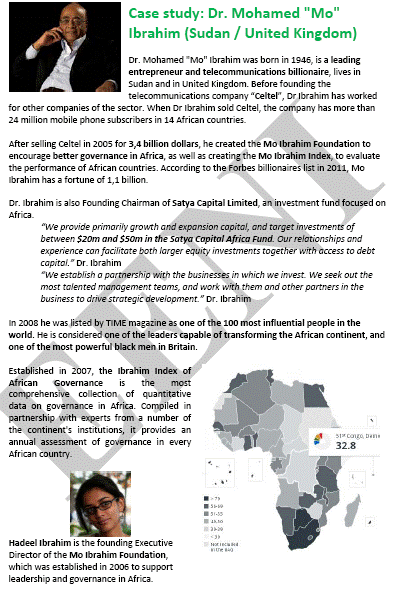
- English, Arab, Swahili, French, and Portuguese are the main languages in the region, as well as other local languages
- The largest economies in East Africa are Kenya, Sudan, and Egypt
- Ethiopia has a major political role (the headquarters of the African Union are in Addis Ababa)
- The major religions in East Africa are Christianity, African Traditional Religions and Islam
- The largest ports in East Africa are Port Said (Suez Canal), Port of Dar es Salam, Port of Djibouti, Port of Mombasa, Port of Maputo, and Port of Toamasina
- The Trans-African corridors across East Africa are the Cairo-Gaborone Corridor, Northern Corridor, Lagos-Mombasa Corridor, Central Corridor, N’Djamena-Djibouti Corridor, North-South Corridor, Asia-Africa Growth Corridor, and Beira-Lobito Corridor
Personalities and Businesspeople in East Africa: Mohamed Ibrahim, Reginald Mengi, Minoush Abdel-Meguid, Bethwell Allan Ogot, Mimi Alemayehou, Onsi Sawiris, Osama Abdul Latif, Ahmed Mekky, Iman, Ali Al'amin Mazrui, Tarek Talaat Moustafa, Bhimji Depar Shah, Mohammed Hussein Ali Al-Amoudi, Mohamed Mansour, Mohammed Dewji, Hassan Abdalla, Said Bakhresa, and Naushad Merali.
In East Africa there are several Regional Economic Communities and Agreements:

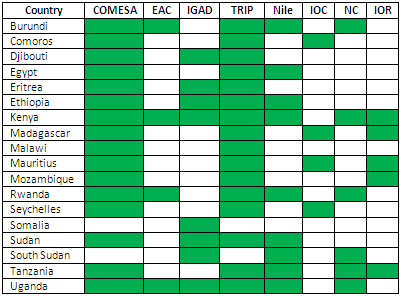
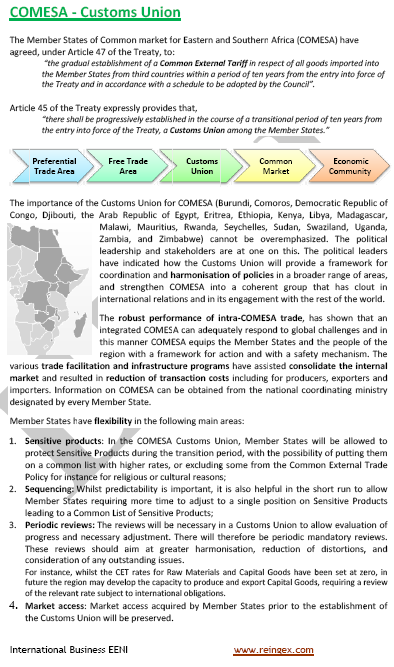
- Eritrea, Ethiopia, Kenya, Somalia, Sudan, Uganda, and Djibouti are members of the Intergovernmental Authority on Development (IGAD)
- Kenya, Uganda, Tanzania, Rwanda, and Burundi are members of the East African Community (EAC). South Sudan has requested the access
- Burundi, the Comoros, Djibouti, Egypt, Eritrea, Ethiopia, Kenya, Madagascar, Malawi, Mauritius, Rwanda, the Seychelles, Sudan, South Sudan, Tanzania, and Uganda are members of the Common Market for Eastern and Southern Africa (COMESA)
- Malawi, Madagascar, Mauritius, Mozambique, the Seychelles, and Tanzania are part of the Southern African Development Community (SADC)
- All the East African Countries are members of the COMESA, SADC, and COMESA-EAC-SADC Agreement
- The Comoros, Madagascar, Mauritius, and the Seychelles are members of the Indian Ocean Commission (IOC)
- Burundi, Egypt, Ethiopia, Kenya, Rwanda, South Sudan, Sudan, Tanzania, and Uganda are members of the Nile Basin Initiative
- Kenya, South Sudan, Sudan, Tanzania, and Uganda are members of the Conference on the Great Lakes
- Burundi and Rwanda are members of the Economic Community of the Great Lakes Region
- The Comoros, Kenya, Madagascar, Mauritius, Mozambique, the Seychelles, and Tanzania are members of the Indian-Ocean Rim Association
- Egypt, Eritrea, Somalia, Sudan, and Djibouti are part of the Community of Sahel-Saharan States (CEN-SAD)
- Burundi is a member of the Economic Community of Central African States (ECCAS)
Tripartite member countries
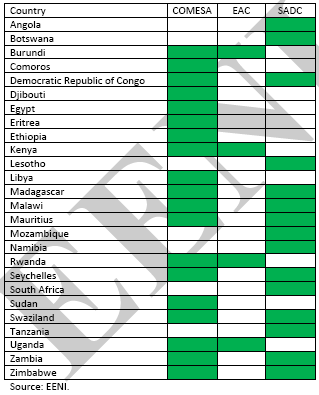

All the East African Countries are members of the African Development Bank, AUDA-NEPAD, African Union, and Economic Commission for Africa.
Interactions of the East African Economic Area.
The Comoros, Egypt, Malawi, Mozambique, Somalia, Sudan, Uganda, and Djibouti are members of the Organization of Islamic Cooperation.
- Islamic Chamber of Commerce
- Standing Committee for Economic Cooperation
- Islamic Centre for Development of Trade
- Statistical, Economic and Social Research
Trade Preferential System of the OIC.
- No country in East Africa has signed the Framework Agreement + PRETAS (Protocol on the Preferential Tariff Scheme) + Rules of origin
- Egypt, Sudan, Somalia, the Comoros, and Djibouti have signed the Framework Agreement + PRETAS
- Libya and Uganda only have signed the Framework Agreement
- Mozambique has not yet ratified the agreement
Libya, Mozambique, Somalia, Sudan, Uganda, the Comoros, Djibouti, and Egypt are members of the Islamic Development Bank.
All the East African Countries are beneficiaries of the Arab Bank for Economic Development in Africa (BADEA).
Arab Development Funds recipients: Egypt, Sudan, Somalia, Uganda, the Comoros, Djibouti, and Mozambique.
The Comoros, Djibouti, Egypt, Libya, Somalia, and Sudan are members of the Arab League, Afro-Arab Cooperation, Summit of South American-Arab Countries, and Asia-Middle East Dialogue.
The Comoros, Djibouti, Rwanda, Eritrea, Madagascar, Ethiopia, Malawi, Burundi, Uganda, Kenya, Somalia, Mozambique, Sudan, South Sudan, and Tanzania are beneficiaries of the SPG of the EU
Egypt is a member of the Euro-Mediterranean Partnership.
The EU has a trade agreement with the SADC.
The EU has an Economic Partnership Agreement with Egypt.
The Comoros, Burundi, Republic of the Congo, the DR Congo, Djibouti, Eritrea, Ethiopia, Kenya, Madagascar, Malawi, Mauritius, Mozambique, Rwanda, the Seychelles, Somalia, Sudan, Tanzania, and Uganda are beneficiaries of the Africa-EU Partnership.
The EFTA has a Trade Agreement with Egypt.
Mauritius has a Preferential Trade Area with Pakistan.
Bharat (India) has an agreement with Mauritius. This free trade agreement is essential for the Africa-India relationships. Furthermore, India has trade agreements with Mozambique, Rwanda, the Seychelles, Tanzania, and Uganda.
All the countries of East Africa (except Sudan) are beneficiaries of the AGOA of the U.S..
The MERCOSUR has a trade agreement with the SADC.
The Comoros, Kenya, Madagascar, Mauritius, Mozambique, the Seychelles, and Tanzania are members of the Indian-Ocean Rim Association (IORA).
Egypt has an Agreement with the MERCOSUR and is a member of the Agadir Agreement.
The COMESA member countries have a Trade and Investment Framework Agreement with the U.S..
The EAC member countries have a Free Trade Agreement with the U.S..
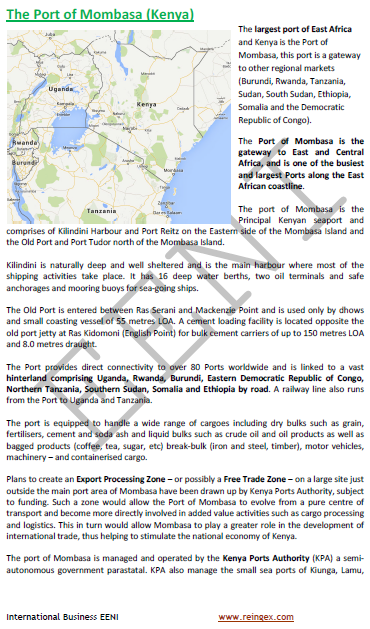
(c) EENI Global Business School (1995-2024)
We do not use cookies
Top of this page



